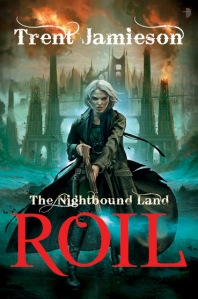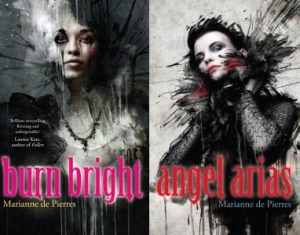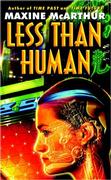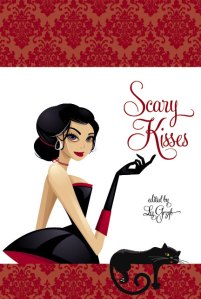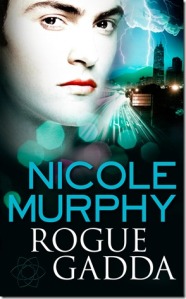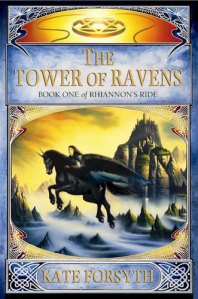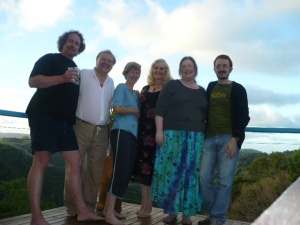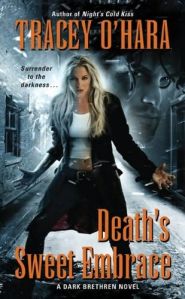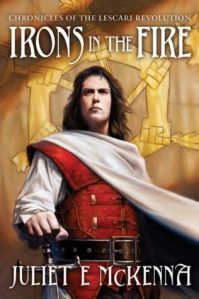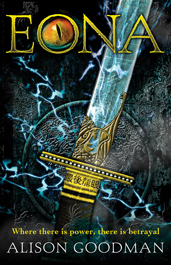As the next of my series featuring fantastic female fantasy authors (see disclaimer) I’ve invited the prolific and talented Karen Miller to drop by.
Watch out for the give-away question at the end of the interview.

Q: I see you also write as KE Mills and are writing the Rogue Agent series under this name. Why would you write fantasy under two different names?
As Karen Miller, I write epic/historical fantasy, in self-contained story arcs covering a finite number of ‘acts’ – so I’m telling the story across 2, 3 or soon 5 volumes. The historical influences I draw upon for these books range from ancient Mesopotamia right through to Rennaisance Europe. On the other hand, the Rogue Agent books are part of an open ended series, in which continuing characters have stand alone adventures – even though there are some story elements that carry through more than one book. Also, the historical influence is late Victorian/early Edwardian England. That means there is a distinctly different flavour/atmosphere between the kinds of fantasy I’m writing, so Voyager thought it would be a good idea to differentiate them.
Q: You write for Stargate. Are you a big fan? Was it a real buzz to get the chance to write these books? How did it come about?
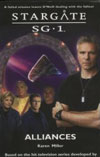 I have indeed written media tie in books for the Stargate SG1 universe. I’m a fan of the show, and always will be – especially of the first 6 seasons. I had the best fun writing Alliances and Do No Harm! It’s such a privilege, being given the chance to play in a storytelling sandbox built by someone else, that’s given me enormous pleasure over the years. I got the chance because the people at Fandemonium, who have the Stargate tie in rights, read my Stargate SG1 fanfic (the Medical Considerations series) and thought I’d be a good fit. MGM were fine with it, and so I was paid the enormous compliment of being given the nod to write the books.
I have indeed written media tie in books for the Stargate SG1 universe. I’m a fan of the show, and always will be – especially of the first 6 seasons. I had the best fun writing Alliances and Do No Harm! It’s such a privilege, being given the chance to play in a storytelling sandbox built by someone else, that’s given me enormous pleasure over the years. I got the chance because the people at Fandemonium, who have the Stargate tie in rights, read my Stargate SG1 fanfic (the Medical Considerations series) and thought I’d be a good fit. MGM were fine with it, and so I was paid the enormous compliment of being given the nod to write the books.
Q: Another fan-girl moment. You have also written a Star Wars book, The Clone Wars: Wild Space. How did you get the chance to write for Star Wars?
 I’ve actually done 3 Star Wars novels – Wild Space, and then the two-part Clone Wars Gambit story, Stealth and Siege. Again, what an enormous privilege. I fell in love with Star Wars back in 1977, sitting in Hoyts cinema on George Street, watching the star destroyer roar over our heads. It sounds crazy, but the experience really did change my life. So many things have happened to me because of that film, and I will forever be in George Lucas’s debt. Probably I wouldn’t have the writing career I have now without him. Anyhow, I knew there were professionally published Star Wars novels, and I knew you had to be a professional writer to be considered. Once The Innocent Mage was published, I contacted the Star Wars editor at Del Rey and expressed an interest in writing for them, if ever they needed a new author. We had a lovely conversation but nothing came of it, so I just shrugged and got on my with my own original fiction. Then a couple of years later they asked if I’d be interested in tag team writing some novels set in the Clone Wars. I’d been recommended by hugely popular Star Wars writer Karen Traviss, to whom I owe so very much. It took me about 2 seconds to say yes. *g* And that’s how I got one of the best gigs in the world of speculative fiction.
I’ve actually done 3 Star Wars novels – Wild Space, and then the two-part Clone Wars Gambit story, Stealth and Siege. Again, what an enormous privilege. I fell in love with Star Wars back in 1977, sitting in Hoyts cinema on George Street, watching the star destroyer roar over our heads. It sounds crazy, but the experience really did change my life. So many things have happened to me because of that film, and I will forever be in George Lucas’s debt. Probably I wouldn’t have the writing career I have now without him. Anyhow, I knew there were professionally published Star Wars novels, and I knew you had to be a professional writer to be considered. Once The Innocent Mage was published, I contacted the Star Wars editor at Del Rey and expressed an interest in writing for them, if ever they needed a new author. We had a lovely conversation but nothing came of it, so I just shrugged and got on my with my own original fiction. Then a couple of years later they asked if I’d be interested in tag team writing some novels set in the Clone Wars. I’d been recommended by hugely popular Star Wars writer Karen Traviss, to whom I owe so very much. It took me about 2 seconds to say yes. *g* And that’s how I got one of the best gigs in the world of speculative fiction.
Q: You wrote the Kingmaker, Kingbreaker series, the Godspeaker series, as well as the Stargate books, the Star Wars book and the K E Mills books. When do you sleep? No, seriously, what’s your writing day schedule and how do you finish so many books?
In short, I put the rest of my life on hold to focus on pretty much nothing but the work. Looking back on the past 5 years, I consider that I’ve been serving my apprenticeship. In writing so much, in so many different worlds, I feel like I’ve been taking a crash course in storytelling. As a result, I think I’ve widened my skill set and honed my craft. Now, as I face the biggest challenge so far in my career, a huge 5 books historical/epic fantasy series, I feel slightly better equipped to get stuck in. There’s so much competition in the world of speculative fiction literature, I think it’s easy to get lost in the crowd when you’re starting out. So I made the conscious decision to write as much as I could, as well as I could, and establish myself as a presence on the book shelf. As I say, it meant putting most of the rest of my life on hold but for me, the choice was absolutely worth it. Now I can ease off the pressure a bit, and really focus on telling this new story as well as I possibly can.
Q: Your books have been finalists in the Aurealis Awards fantasy section three times, plus two of your books have been honoured in the James Tiptree Jr Award. That must have been a real buzz. Did attention from the James Tiptree Jr Award come as a surprise, since you write epic fantasy?
 The Tiptree honour was a huge shock, because I had no idea the books had been entered! Sneaky Voyager. It was an enormous compliment. All my short listings have been. With the Tiptree, with its focus on female characters in the genre, it was particularly pleasing. I love epic fantasy, but a lot of it is written from the male pov, with a male audience in mind, so it’s been fun to shake that up a bit and show that there can be epic fantasy showcasing the strengths of great women, too.
The Tiptree honour was a huge shock, because I had no idea the books had been entered! Sneaky Voyager. It was an enormous compliment. All my short listings have been. With the Tiptree, with its focus on female characters in the genre, it was particularly pleasing. I love epic fantasy, but a lot of it is written from the male pov, with a male audience in mind, so it’s been fun to shake that up a bit and show that there can be epic fantasy showcasing the strengths of great women, too.
Q: I see you’ve signed a new deal with Orbit for a 5 book deal to write an epic fantasy saga called The Tarnished Crown Quintet. (Congratulations!)Will this be under Karen Miller of KE Mills?
Thanks! This is a Miller adventure. Hugely exciting, and even more terrifying. Biggest challenge of my life so far. Fingers crossed I’m up for it!
Q: I see you like to listen to music while you write. Do you make up a play-list for each series to get you in the right mood? If so, what’s you current play-list?
 I don’t do play lists, as such, I just whack the cds into the player. I go by composers … Bear McCreary, Hans Zimmer, John Williams, James Horner, Alan Silvestri … anyone who writes powerfully emotional music that helps me access my own creative emotionality.
I don’t do play lists, as such, I just whack the cds into the player. I go by composers … Bear McCreary, Hans Zimmer, John Williams, James Horner, Alan Silvestri … anyone who writes powerfully emotional music that helps me access my own creative emotionality.
Q: You worked with horses when you lived in England and you used to breed, train and judge horses here in Australia, but have stopped now. Do you find your practical knowledge of horses really useful for writing fantasy?
I think so. Given that epic/historical fantasy is generally set in a time frame where horses are ubiquitous, it helps to have a feel for them, I think, as well as some basic understanding of the facts. Plus you can get some good plot points out of the whole horse business.
Q: You are involved in the Castle Hill Players, a local community theatre group. (I belonged to a children’s theatre group and loved it. I really do know what greasepaint smells like!). Do you find that performing on stage gives you a unique perspective for writing fantasy minstrels?
 There’s certainly that aspect. Also, I find that writing is like being an actor in a one-woman show. I have to become all these different people as I’m writing them, so the experience of acting and directing really helps me get into their skins and bring them to life.
There’s certainly that aspect. Also, I find that writing is like being an actor in a one-woman show. I have to become all these different people as I’m writing them, so the experience of acting and directing really helps me get into their skins and bring them to life.
Q: I was prompted to start this series of interviews because there seems to be a perception in the US and the UK that fantasy is a bit of a boy’s club. Do you think there’s a difference in the way males and females write fantasy?
I think there’s a difference between the way men and write, full stop. Men and women experience the same world very differently, for many many reasons, and I think those differences are inevitably reflected in our writing. In terms of the ‘boy’s club’ question, well, I think that’s more a case of the readership and the gatekeepers of the readership. When you’re talking urban fantasy, that’s a sub genre that’s dominated by the female voice. In many ways, UF is women’s answer to noir fiction. To me, at heart it’s about female empowerment – or at least, it seems to me that’s how it’s evolved. And then you’ve got the paranormal romance sub genre, which again is dominated by women’s voices. That has to be inevitable, I think, given that romance is pretty much a female genre, though there are men who read and enjoy romance fiction.
Then you’ve got the question of epic/historical fantasy. Until recently it’s been the default standard for fantasy fiction, and it arises directly out of the Tolkien school of literature, and the Dungeons and Dragons culture – both of which are traditionally male-centric. As a result, this (now sub) genre is traditionally male oriented. The biggest names writing it are male, and the loudest voices discussing it are male, and the writers getting the lion’s share of the spotlight are male. So yes, as a female writer, sometimes it does feel as though women epic fantasy novelists aren’t accorded the same amount of oxygen in the conversation. I look at the achievements of a writer like Kate Elliott, whose Crown of Stars series is easily as complicated and challenging and epic as Martin’s work, and she is not anywhere near as visible. I find that difficult to sit with. However, I’ll note that my publisher, Orbit, is a brilliant champion of women writing epic fantasy. From what I can see, the resistance tends to come from the gatekeepers of the epic fantasy sub genre. They’re predominantly male, and they consistently focus on male writers, and that means the women writing epic/historical fantasy often get short-changed. And when you get male reviewers openly disparaging female writers in high profile genre magazines, well, that doesn’t make the situation any easier.
Having said all that, though, I think it must also be said that many of the traditional elements associated with epic/historical fantasy are elements that don’t traditionally appeal to women, either as writers or readers. But that doesn’t mean that no women are interested in them, or that women aren’t capable of writing them with the same flair and authenticity as men. What’s happening, I think, is that some people are falling victim to gender biases and assumptions, which is unfortunate.
Q: Following on from that, does the gender of the writer change your expectations when you pick up their book?
 I wish I could say no, but I think it does, to an extent. Epic fantasy written by men tends – and I say tends, it’s not a universal truth – to be heavier on action than emotion. Often there’s no romantic element to the storytelling and certainly a de-emphasis on female characters. For whatever reasons, those are elements that I really want to see in the books I read. Patrick Rothfuss said on a panel recently that he’s encountered a lot of resistance to the notion of romance in fantasy. I think that’s sad, because I don’t believe for a moment that men don’t want and need love in their lives as much as any woman. And if there is a percentage of men who find romance in epic fantasy confronting, well, that’s no reason to eliminate it – and by extension, women – from this sub genre of speculative fiction. Absolutely there is an important place for the male-centric story, the male bonding story, all that stuff. It’s as vital as the female empowerment of urban fantasy. But it shouldn’t exist at the expense of epic fantasy that presents are more gender-equal view of the world, where men and women fight the good fight side by side, sometimes falling in love along the way.
I wish I could say no, but I think it does, to an extent. Epic fantasy written by men tends – and I say tends, it’s not a universal truth – to be heavier on action than emotion. Often there’s no romantic element to the storytelling and certainly a de-emphasis on female characters. For whatever reasons, those are elements that I really want to see in the books I read. Patrick Rothfuss said on a panel recently that he’s encountered a lot of resistance to the notion of romance in fantasy. I think that’s sad, because I don’t believe for a moment that men don’t want and need love in their lives as much as any woman. And if there is a percentage of men who find romance in epic fantasy confronting, well, that’s no reason to eliminate it – and by extension, women – from this sub genre of speculative fiction. Absolutely there is an important place for the male-centric story, the male bonding story, all that stuff. It’s as vital as the female empowerment of urban fantasy. But it shouldn’t exist at the expense of epic fantasy that presents are more gender-equal view of the world, where men and women fight the good fight side by side, sometimes falling in love along the way.
By the same token, if I pick up a fantasy novel written by a woman, I generally expect a softer, more emotion/character driven story. Often the focus isn’t on the miltary aspect of epic fantasy. But that doesn’t mean it’s all women can write, and it doesn’t mean that men can’t incorporate these more ‘feminine’ traits into their fiction with huge success. At the end of the day, we are all human beings who live and love and grieve and celebrate – and I think our stories should reflect that.
Ronald D Moore, the showrunner of the rejigged Battlestar Galactica, talks a lot about this on his dvd commentaries. He makes the point over and over that given the choice between losing a scene that’s all SFX and shoot’em up, and a scene that explores/reveals character, with emotion, he’ll lose the action sequence every time. To him, character is at the heart of storytelling. I’m rowing in his boat. That’s what I aim for in my writing, what I look for when enjoying someone else’s story, and what I think makes for the best story experience.
 Q: And here’s the fun question. If you could book a trip on a time machine, where and when would you go, and why?
Q: And here’s the fun question. If you could book a trip on a time machine, where and when would you go, and why?
I’d go back to Elizabethan England, to the court of Elizabeth, so I could see her in person.
Karen has a copy of her latest book A Blight of Mages to give-away. Here’s Give-away Question: Would you rather live in the Stargate Universe or the StarWars Universe?
See Karen’s LJBlog.




